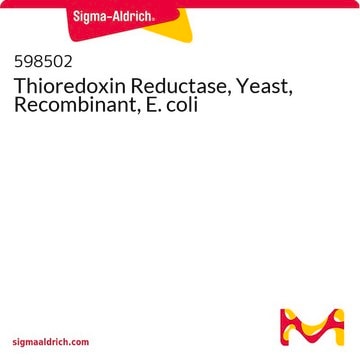CS0170
Thioredoxin Reductase Assay Kit
1 kit sufficient for 100 assays (1 mL)
Synonym(s):
Thioredoxin Reductase Activity Kit
Sign Into View Organizational & Contract Pricing
All Photos(2)
About This Item
UNSPSC Code:
12161503
NACRES:
NA.84
Recommended Products
Quality Level
usage
kit sufficient for 100 assays (1 mL)
shipped in
dry ice
storage temp.
−20°C
Gene Information
human ... TXNRD1(7296) , TXNRD2(10587) , TXNRD3(114112)
Related Categories
General description
The Thioredoxin Reductase Assay Kit uses a colorimetric assay for the determination of thioredoxin reductase activity in mammalian cells and tissues. It is based on the reduction of 5,5′-dithiobis(2-nitrobenzoic) acid (DTNB) with NADPH to 5-thio-2-nitrobenzoic acid (TNB) that produces a strong yellow color that is measured at 412 nm.
DTNB + NADPH + H+ ↔ 2 TNB + NADP+
DTNB + NADPH + H+ ↔ 2 TNB + NADP+
Application
Using post nuclear extracts of rat liver, the kit shows linearity up to 0.25 units per mL. In this preparation, ~20% of the activity is due to non-specific reductase activity (refractory to the TrxR inhibitor).
Features and Benefits
- An easy and simple method
- The kit contains all the reagents required for a colorimetric assay of mammalian thioredoxin reductase
- The kit includes an inhibitor solution for specific inhibition of mammalian thioredoxin reductase
- The kit has been tested with heart muscle, as well as lysates from cell lines such as HeLa, A549, Jurkat, U937, A431, COS, CHO, and NIH 3T3 cells
Kit Components Only
Product No.
Description
- Assay Buffer 5x for Thioredoxin Reductase 30 mL
- Thioredoxin Reductase 10 μg
- Thioredoxin Reductase Inhibitor Solution .05 mL
- 5,5'-Dithiobis(2-nitrobenzoic) acid (DNTB) 150 mg
- NADPH 25 mg
- Dimethyl Sulfoxide (DMSO) 7.5 mL
Signal Word
Warning
Hazard Statements
Precautionary Statements
Hazard Classifications
Repr. 2
Storage Class Code
10 - Combustible liquids
Flash Point(F)
188.6 °F
Flash Point(C)
87 °C
Certificates of Analysis (COA)
Search for Certificates of Analysis (COA) by entering the products Lot/Batch Number. Lot and Batch Numbers can be found on a product’s label following the words ‘Lot’ or ‘Batch’.
Already Own This Product?
Find documentation for the products that you have recently purchased in the Document Library.
Customers Also Viewed
Francesca Magherini et al.
Oncotarget, 9(46), 28042-28068 (2018-07-03)
Au(NHC) and Au(NHC)2, i.e. a monocarbene gold(I) complex and the corresponding bis(carbene) complex, are two structurally related compounds, endowed with cytotoxic properties against several cancer cell lines. Herein, we explore the molecular and cellular mechanisms at the basis of their
Melissa A Fath et al.
Clinical cancer research : an official journal of the American Association for Cancer Research, 17(19), 6206-6217 (2011-08-17)
Cancer cells (relative to normal cells) show increased steady-state levels of hydroperoxides that are compensated by increased glucose and hydroperoxide metabolism. The current study determined whether inhibitors of glucose and hydroperoxide metabolism could induce chemoradiosensitization by enhancing oxidative stress in
Tessa D Epstein et al.
ACS infectious diseases, 5(10), 1682-1687 (2019-09-06)
Helicobacter pylori (H. pylori) infection poses a worldwide public health crisis, as chronic infection is rampant and can lead to gastric ulcers, gastritis, and gastric cancer. Unfortunately, frontline therapies cause harmful side effects and are often ineffective due to antibiotic resistance.
Matthew T Harper
Platelets, 30(1), 98-104 (2017-12-02)
Platelets are central to normal hemostasis and must be tightly controlled to prevent thrombosis. However, drug treatments that also affect platelets could lead to unwanted side effects on hemostasis or thrombosis. In this study, the effect of auranofin on platelets
Javier Quero et al.
Biomedicines, 9(12) (2021-12-25)
Overheating can affect solubility or lipophilicity, among other properties, of some anticancer drugs. These temperature-dependent changes can improve efficiency and selectivity of the drugs, since they may affect their bioavailability, diffusion through cell membrane or activity. One recent approach to
Our team of scientists has experience in all areas of research including Life Science, Material Science, Chemical Synthesis, Chromatography, Analytical and many others.
Contact Technical Service












